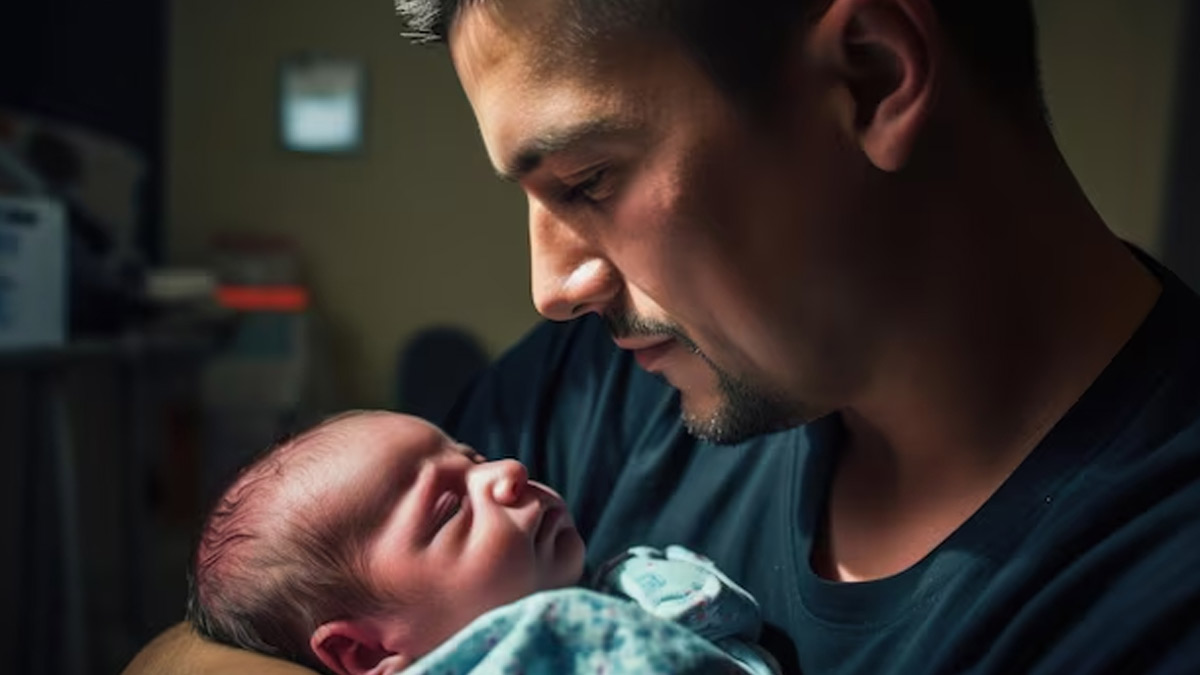
Postpartum Depression is an unfortunate consequence of pregnancy, which occurs in 6.5% to 20% of women. Postpartum depression is widely considered a ‘woman problem,’ but studies show that some fathers can also suffer from postpartum depression. In fact, ‘the prevalence of prenatal and postpartum depression in fathers was relatively common,’ stated a study published in the ‘Journal of Affective Disorders (JAD).’
To understand this phenomenon, the team of OnlyMyHealth spoke to Dr Rashmi Satpute, Consultant, Psychiatrist, Manipal Hospital, Baner, Pune, Maharashtra, who stated, “Yes, of course, men go through postpartum depression. It is not as common as it is seen in females, but studies show that one in ten fathers experience postpartum depression.”
Postpartum Depression In Men

The JAD study revealed that out of 20,728 participants, postpartum depression was 8.75% prevalent within a whole year, 8.98% within the first month after childbirth, 7.82% between the first three months, 9.23% between months 3-6, and 8.40% between months 6-12 after childbirth.
Offering her insight into why this phenomenon happens in men, Dr Satpute said, “Becoming a parent is life-changing. So at times it cannot be handled or coped with easily by a father as well.” Listing the reasons, she shared that a combination of the following factors is usually the cause:
- Additional burden of responsibility.
- Extreme changes in routine and lifestyle.
- The financial pressure of an additional human, plus the medical expenses that come with a newborn.
- Lack of attention from the mother has caused stress in the relationship.
- Fatigue.
- If the mother is suffering from postpartum depression.
Also Read: ‘Low Risk’ Pregnancies Contribute 46% to India’s Newborn Deaths and Stillbirths: Lancet Study
Symptoms
Corroborating the results provided by JAD, which showed how postpartum depression peaked after the first three months of childbirth, Dr Satpute said, “These symptoms come gradually. As a new parent, it is very normal to feel stressed, anxious, and tired. But these symptoms persist for months, which means it's time to seek help.” She shared a list of symptoms that indicate postpartum depression in men:
- Feeling lonely
- Constant unhappiness
- Feeling hopeless
- Consistent exhaustion, despite getting adequate sleep at night
- Lethargy
- Anxiety
- Depression
- Panic attack
- Wanting to cry constantly
Postpartum Depression Treatment For Dads

Another study published in JAD, conducted by researchers from McGill University, Canada, stated, ‘Paternal depression negatively impacts children's behavioural and emotional development.’ The researchers recommended that early screening and targeted prevention strategies are the first lines of defence against postpartum depression.
Also Read: Expert Talk: 6 Ways To Deal With Postpartum Depression
Dr Satpute elucidated, “Treating fathers for postpartum depression depends on the severity of the case.” She listed a few self-help techniques that can help fathers prevent or manage mild depression post-birth.
- Stay physically active.
- Try to get enough rest. This is advisable for women as well.
- Take turns to be with the baby,
- Get help from nannies, house help, and family members.
- Some self-time is crucial.
- Manage your daily tasks one at a time. Do not jump to the whole to-do list to avoid feeling overwhelmed.
- Let out your emotions by talking to people you trust. Talking can be cathartic and help you shed the burden you have been carrying within your mind.
- Try support groups on Facebook, Instagram and Twitter, where people share similar experiences and how they overcame them.
In conclusion, postpartum depression in men is vastly overlooked, even though its reasons sound highly relatable for any new father. This is a testament to the fact that mental health issues are often underestimated and ridiculed in the case of men. To help break the stigma, Dr Satpute concluded by advising fathers to seek a licensed therapist or a psychologist if their symptoms of depression persist even after trying the self-help techniques. Timely treatment is the only answer here, and there is no shame, only honour, in addressing your health and getting treated for it.
Also watch this video
How we keep this article up to date:
We work with experts and keep a close eye on the latest in health and wellness. Whenever there is a new research or helpful information, we update our articles with accurate and useful advice.
Current Version